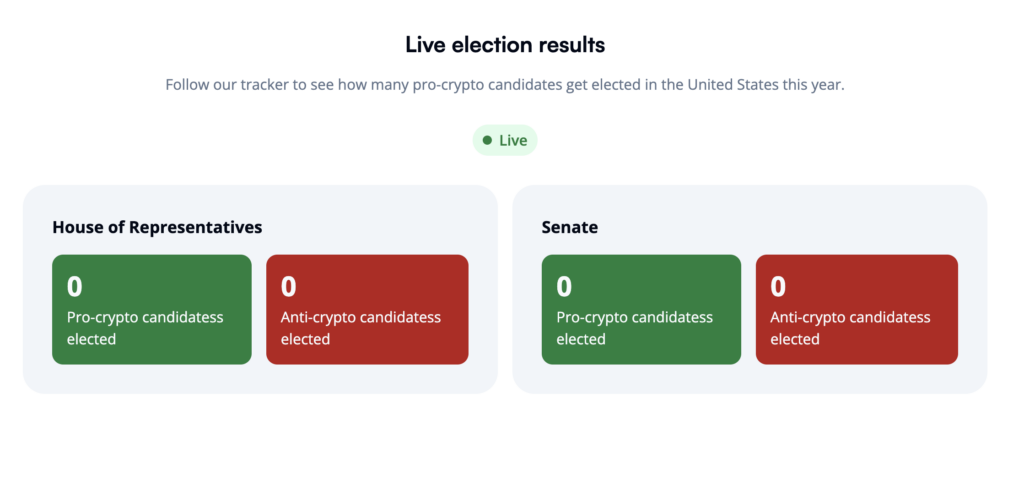Outside of today’s Presidential Election, the crypto industry is significantly impacting the 2024 US Senate races by channeling substantial financial support to pro-cryptocurrency candidates, aiming to influence the legislative landscape.
In the presidential race, Trump has been the more vocal crypto supporter, while Harris rarely mentioned the industry in her campaign messaging.
The Stand With Crypto PAC has consistently tracked politicians’ positions on crypto throughout the race so far. Outside the Presidency, the organization has identified the key races in today’s election. Several Senate seats in swing states and throughout the country are on the ballot, and the industry supports candidates across both aisles.

In Ohio, incumbent Senator Sherrod Brown, a Democrat and vocal critic of digital assets, faces a strong challenge from Republican Bernie Moreno, a former blockchain entrepreneur. Moreno advocates for making Cleveland a hub for blockchain startups and promises to “defend crypto” in the Senate. Per Axios, crypto groups have spent over $40 million supporting Moreno’s campaign, making the race one of the most expensive in history.
In Montana, Democratic Senator Jon Tester, who has publicly questioned the legitimacy of crypto, is contested by Republican Tim Sheehy, a business leader with connections to major financial firms. The crypto industry views this race as an opportunity to replace one of its skeptics. Crypto super PACs have amassed over $80 million for strategic campaign spending in critical states like Montana, seeing these elections as pivotal for their interests.
Pennsylvania’s Senate race features Democrat Bob Casey Jr., who has shown mixed signals toward crypto regulation. While he has supported some industry-friendly measures, he also co-sponsored the Digital Asset Anti-Money Laundering Act of 2023. His Republican opponent, Dave McCormick, is a strong crypto and blockchain technology proponent. As reported by Sahm Capital, Coinbase CEO Brian Armstrong has endorsed McCormick, citing him as the better candidate on crypto issues.
Arizona presents a unique scenario where both major candidates support crypto. Democrat Ruben Gallego, who previously criticized crypto, has shifted his stance and now holds an A rating from Stand With Crypto. Republican Kari Lake positions herself as “very pro-crypto,” emphasizing the sector’s importance to Arizona’s economy. NBC News notes that the crypto industry’s financial backing of Gallego has stirred debate within Republican circles.
The most high-profile battle will occur in Massachusetts, where incumbent Senator Elizabeth Warren, a leading critic of the crypto industry, faces Republican challenger John Deaton, a well-known crypto advocate and attorney. Deaton has significant support from the crypto community, including contributions from prominent figures like the Winklevoss twins. Despite this, Warren maintains a strong lead in the race, reflecting Massachusetts’ traditional Democratic leanings.
Michigan’s Senate race sees Democrat Elissa Slotkin, who has evolved from skepticism to support crypto, competing against Republican Mike Rogers, a strong crypto advocate emphasizing national security concerns related to digital assets. Both candidates have received A-ratings from Stand With Crypto, and the race has attracted considerable attention and funding from the crypto industry.
Lastly, Nevada’s Senate race features incumbent Democrat Jacky Rosen and Republican Sam Brown, both of whom are strong crypto supporters. Stand With Crypto highlights that both candidates emphasize the role of digital assets in economic growth and innovation. The race has been relatively quiet, with traditional issues taking precedence over crypto policy.
These races collectively demonstrate the crypto industry’s strategic investment in shaping the future of US financial regulation. Stand With Crypto is also tracking other races deemed to have a lesser impact on the industry with its election tracker.
By supporting candidates favorable to digital assets, the industry aims to foster a legislative environment conducive to innovation and growth in the crypto sector.
The significant financial contributions and endorsements stress the high stakes involved as crypto proponents and critics vie for influence in the upcoming elections.
The post These are the most important crypto races in the US Election today outside of the Presidency appeared first on CryptoSlate.





















